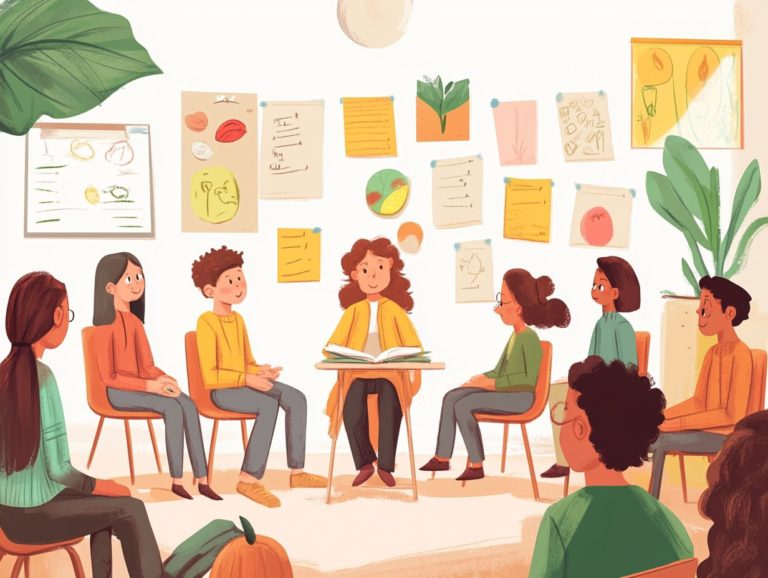5 Effective Workshops for Emotional Awareness
Contents
- Enhancing Emotional Awareness through Workshops
- Workshops Overview
- Key Takeaways:
- 1. Mindfulness Meditation Workshop
- 2. Cognitive Behavioral Therapy Workshop
- Art Therapy Workshop
- Emotional Intelligence Workshop
- 5. Journaling Workshop
- What Is Emotional Awareness and Why Is It Important?
- What Are the Benefits of Each Workshop?
- Who Can Benefit from Attending These Workshops?
- Frequently Asked Questions
- What are the 5 effective workshops for emotional awareness?
- How can Mindfulness Meditation help with emotional awareness?
- What is the purpose of Journaling in emotional awareness workshops?
- How can Art Therapy improve emotional awareness?
- What role does Group Therapy play in emotional awareness workshops?
- Why is Emotional Intelligence Training important for emotional awareness?
Enhancing Emotional Awareness through Workshops
Emotional awareness is an essential skill that deepens your understanding of both yourself and your interactions with others, as highlighted in the works of Daniel Goleman.
Consider participating in five engaging workshops specifically designed to elevate your emotional awareness and intelligence:
Workshops Overview
- Mindfulness Meditation
- Cognitive Behavioral Therapy
- Art Therapy
- Emotional Intelligence
- Journaling
- Emotional Intelligence Certification
Each of these workshops presents unique advantages that can significantly transform your emotional well-being and enhance your daily life. For instance, Gill Hasson s Emotional Intelligence Pocketbook can be a valuable resource.
Whether you are pursuing personal growth or looking for techniques to support those around you, these workshops offer valuable insights and practical strategies to help you thrive emotionally. They are particularly beneficial for Millennials seeking to improve their workplace relationships.
Key Takeaways:

- Practicing Mindfulness Meditation can help increase self-awareness and regulate emotions, as advocated by Salovey and Mayer.
- Cognitive Behavioral Therapy workshops can provide tools for identifying and changing negative thought patterns, crucial for emotional self-management.
- Engaging in Art Therapy can be a creative and therapeutic way to express and process emotions.
1. Mindfulness Meditation Workshop
Inspired by the principles of the Pomodoro technique, this workshop aims to maximize your focus and emotional regulation. The Mindfulness Meditation Workshop is designed to elevate your emotional intelligence through self-awareness and personal development.
This workshop is invaluable for enhancing workplace relationships and nurturing a positive work environment. You ll actively engage in mindfulness practices that foster emotional self-management.
This equips you to navigate workplace conflicts and improve team dynamics with ease. Techniques like guided breathing exercises and visualization practices will enable you to connect with your emotions and identify your triggers.
This heightened self-awareness gives you the ability to respond thoughtfully rather than react impulsively during challenging interactions. This paves the way for healthier communication.
Group activities, such as the Leadership Pizza exercise, promote collaboration and foster a sense of community. This reinforces trust and understanding among your colleagues.
By implementing these mindfulness strategies, you not only sharpen your interpersonal skills but also help cultivate a more harmonious workplace culture, where empathy and active listening thrive as the standard.
2. Cognitive Behavioral Therapy Workshop
This workshop incorporates the Feeling Wheel to help you identify and understand your emotional triggers. The Cognitive Behavioral Therapy Workshop offers you invaluable insights into emotional intelligence.
It guides you through the intricacies of self-regulation and the recognition of emotional triggers. These are essential skills for personal growth and effective communication.
With structured empathy exercises, similar to those in the Emotional Intelligence Pocketbook, you will learn to tap into your emotional intelligence. This will enhance workplace dynamics and help you navigate conflicts with newfound ease.
This comprehensive approach sharpens your individual awareness and nurtures meaningful interpersonal connections. You ll be equipped with the skills to express your feelings clearly and empathetically, fostering deeper relationships.
By focusing on the principles of Cognitive Behavioral Therapy, the workshop enables you to confront negative thought patterns and replace them with constructive beliefs.
This sets the stage for healthier emotional responses. As you delve into various scenarios, you will acquire practical tools for self-management, allowing you to cultivate better relationships both professionally and personally.
Ultimately, this transformative experience, supported by Gill Hasson s Emotional Intelligence in Leadership, is designed to create a supportive environment where emotional literacy flourishes. This inspires lasting change in your life.
Transform your life today by learning how to elevate your emotional awareness and intelligence through these workshops. Sign up now or learn more about emotional intelligence for personal and professional growth!
Art Therapy Workshop
This workshop is informed by the theories of Robert Plutchik on emotional expression through creative mediums.
The Art Therapy Workshop presents a remarkable opportunity for you to enhance your emotional intelligence. This approach helps you express your feelings better through creative mediums.
It enriches your emotional vocabulary and promotes personal growth. As you engage in the workshop, you’ll find that it fosters emotional connections among participants. This reinforces teamwork and collaboration, which are essential for improving workplace relationships.
Throughout the workshop, various artistic methods such as painting, sculpting, and music are employed. These methods help you articulate complex emotions that may otherwise remain unexpressed. By immersing yourself in these activities, you can explore your inner thoughts within a safe and supportive environment, encouraging self-discovery and emotional release.
Creating art with others builds empathy as you share your creative processes and personal narratives. This leads to a profound understanding of your peers’ perspectives. By promoting open dialogue and mutual respect, this workshop cultivates a nurturing atmosphere that strengthens team bonds. Ultimately, it improves efficiency in the workplace and aligns with strategies found in the Emotional Intelligence for Leaders guide.
Emotional Intelligence Workshop

This workshop draws on the Emotional Intelligence Action Plan to help participants develop emotional intelligence skills systematically.
The Emotional Intelligence Workshop is designed to elevate your emotional intelligence through specialized training focused on self-awareness and emotional self-management techniques, which are ways to control your emotions effectively.
By equipping you with essential leadership skills and effective communication strategies, this workshop seeks to cultivate deeper emotional connections among team members. This ultimately enhances workplace dynamics and fosters a healthier work environment.
The curriculum features interactive activities, such as role-playing scenarios and engaging group discussions. These activities encourage you to explore your emotional triggers and recognize their impact on your daily interactions. By emphasizing self-awareness, you ll gain the ability to identify your emotional responses and understand how they influence your behavior and decision-making.
The workshop also incorporates mindfulness exercises and reflective practices that contribute to your personal growth. As you develop these skills, you’ll find yourself better equipped to address conflicts constructively and build stronger relationships with your colleagues.
The overarching goal is to enhance interpersonal dynamics and create a supportive environment where everyone feels valued and understood. This aligns with the principles outlined in Emotional Intelligence in Leadership.
5. Journaling Workshop
This workshop includes exercises from the Emotional Intelligence Action Plan to help you systematize your reflective writing practices.
The Journaling Workshop centers around cultivating your emotional intelligence through the art of reflective writing. This significantly boosts your self-awareness and emotional self-management.
By guiding you to delve into your feelings that provoke strong reactions and document your thoughts, this workshop enables your personal development. It equips you with essential tools for navigating workplace conflicts and enhancing your emotional connections.
This practice is documented in the Emotional Intelligence Pocketbook.
Through a variety of journaling techniques such as free writing, guided prompts, and gratitude entries you’ll learn to articulate your feelings and thoughts with greater clarity. These methods foster deeper introspection, allowing you to recognize patterns in your emotional responses.
As you consistently engage with your journal, you’ll cultivate a stronger sense of self. This enables you to communicate more effectively and empathetically with those around you. This approach aligns with the strategies presented in Emotional Intelligence for Professionals.
Start journaling today! You’ll see incredible improvements in your emotional understanding and relationships, making this practice an invaluable asset for enhancing your overall mental well-being. Journaling can serve as an effective component of an Organizational awareness strategy.
What Is Emotional Awareness and Why Is It Important?
As defined by the Cambridge dictionary, emotional awareness is crucial for effective leadership.
Emotional awareness is your ability to recognize and understand your own emotions and those of others. It serves as a cornerstone of emotional intelligence that is vital for your personal development and self-awareness.
Acknowledging this significance can enhance your workplace relationships. It enables you to navigate how people relate to each other with empathy and effective communication.
This capacity includes several essential components, such as emotional recognition, emotional understanding, and emotional regulation. By developing emotional awareness, you not only enhance your interpersonal skills but also equip yourself to manage stress and build resilience in challenging situations.
The Feeling Wheel can be particularly useful for emotional recognition.
In a professional context, a heightened sense of emotional awareness can drastically reduce conflicts. This allows you to approach situations with greater empathy and understanding.
By being attuned to the feelings and perspectives of your colleagues, you can cultivate a more collaborative and harmonious work environment. Ultimately, this drives both team success and your personal growth.
How Can Workshops Help with Emotional Awareness?
Workshops at Ogeechee Technical College offer Emotional Intelligence training tailored to different professional needs.
Workshops play a pivotal role in enhancing your emotional awareness by providing structured environments. Here, you can engage in activities that promote emotional intelligence and personal development.
Through interactive sessions and teamwork, you ll learn to improve your communication skills. You ll also gain valuable insights into your emotional responses, fostering a deeper understanding of yourself and those around you.
This structured approach aligns with the principles of Emotional Intelligence for Professionals.
One common approach used in these workshops is role-playing. This allows you to step into various scenarios and express different emotions authentically.
This practice not only enhances your empathy but also equips you with the skills to navigate conflicts more effectively. These Emotional Intelligence activities are often part of leadership training programs.
Group discussions create a safe space for sharing personal experiences. This enables you to learn from others in a supportive environment.
Feedback sessions further solidify your learning experience by offering constructive insights. These help you refine your emotional responses and communication techniques.
By integrating these methods, workshops effectively contribute to improved teamwork and collaboration. Don t wait! Integrate these methods in workshops to immediately boost teamwork and collaboration, enhancing both interpersonal relationships and overall productivity within your teams.
They also help in managing workplace conflicts and developing effective communication skills.
What Are the Benefits of Each Workshop?

Emotional intelligence, the ability to recognize and manage our own emotions and the emotions of others, is crucial for leadership skills and teamwork.
Every workshop designed to enhance emotional intelligence offers unique benefits for personal growth. These workshops help you manage your emotions better. This leads to improved interactions and collaboration at work.
You will acquire valuable skills such as active listening, empathy, and conflict resolution. These are essential tools for fostering open communication among colleagues. These competencies cultivate mutual respect and enhance your problem-solving abilities.
As you become more adept at understanding your emotions and those of others, you are likely to forge stronger relationships. This minimizes misunderstandings and reduces workplace tension. Gill Hasson mentions that building an emotional vocabulary is key to effective communication.
Ultimately, these workshops encourage a profound sense of belonging and support. This results in heightened job satisfaction and increased productivity for you and your team. These benefits align with the theories presented in the Emotional Intelligence Pocketbook.
Who Can Benefit from Attending These Workshops?
The concepts of emotional intelligence by Robert Plutchik are integrated into these workshops to maximize their effectiveness.
A diverse range of individuals stands to gain from attending emotional intelligence workshops. This includes professionals eager to enhance their workplace relationships, Millennials committed to personal growth, and leaders striving to refine their communication skills.
These workshops are designed for anyone keen on cultivating emotional intelligence. They aim to foster better collaboration and emotional self-management. The Emotional Intelligence Certification from Ogeechee Technical College is a notable example of such a program.
Young adults facing the complexities of academia and early career decisions will find invaluable insights into stress management and resilience-building. Parents can explore techniques that deepen their understanding and connection with their children, creating a nurturing environment that promotes emotional development.
Educators can acquire essential skills to cultivate empathetic classroom dynamics that significantly enhance student learning. Tools like the Feeling Wheel and Leadership Pizza can be especially beneficial in these contexts.
The versatility of emotional intelligence skills knows no bounds. These workshops are universally relevant. Participants are enabled to navigate both personal and professional relationships with newfound ease and effectiveness.
Programs like Emotional Intelligence for Leaders and Emotional Intelligence for Professionals are particularly useful in this regard. Don’t miss out on the chance to transform your workplace dynamics! Sign up for an emotional intelligence workshop today!
How Can One Incorporate the Lessons Learned from Workshops into Daily Life?
Incorporating lessons from emotional intelligence workshops into your daily life can truly elevate your self-awareness and help you manage your emotions. This ultimately fosters a more positive work environment.
You can apply the skills gained during these workshops by practicing mindfulness, engaging in empathy exercises, and actively honing your communication skills with colleagues and friends. According to the Cambridge Dictionary, emotional intelligence encompasses several crucial aspects such as self-regulation and empathy.
Consider journaling to reflect on your emotional responses to daily events. This practice opens up new ways to understand your personal triggers and patterns.
Utilizing a rich emotional vocabulary not only allows you to articulate your feelings more precisely but also helps you identify and address emotional nuances effectively. Apply the Pomodoro technique (a time management method that uses timed intervals) to manage time and stress better.
By setting achievable personal development goals focused on enhancing your communication and teamwork skills, you promote continual growth and adopt a proactive approach to your interpersonal relationships.
Integrating these practices into your routine will enable you to cultivate a more emotionally intelligent mindset, leading to harmonious and productive interactions both in and out of the workplace. Gill Hasson suggests creating an Action Plan to track your progress in emotional intelligence.
Frequently Asked Questions
Understanding emotional intelligence as defined by Daniel Goleman can provide deeper insights.
What are the 5 effective workshops for emotional awareness?

Emotional Intelligence in Leadership is also a key area of focus in these workshops.
The 5 effective workshops for emotional awareness are: Mindfulness Meditation, Journaling, Art Therapy, Group Therapy, and Emotional Intelligence Training. These workshops are fundamental to developing organizational awareness and improving workplace relationships.
How can Mindfulness Meditation help with emotional awareness?
Mindfulness Meditation involves focusing on the present moment, which allows individuals to become more aware of their emotions and how they are feeling. It also helps reduce stress and increase self-awareness.
What is the purpose of Journaling in emotional awareness workshops?
Journaling provides a safe and private space for individuals to reflect on their emotions and express themselves without judgment. It can help identify patterns in emotions and promote self-discovery and understanding.
How can Art Therapy improve emotional awareness?
Art Therapy uses creative techniques to help individuals explore and express their emotions. It can be particularly beneficial for those who have difficulty verbalizing their feelings, promoting insight and self-awareness.
What role does Group Therapy play in emotional awareness workshops?
Group Therapy provides a supportive and collaborative environment where individuals can share and process their emotions with others. It also allows for the development of empathy and understanding of others’ emotions.
Why is Emotional Intelligence Training important for emotional awareness?
Emotional Intelligence Training is also a cornerstone of Emotional Intelligence Certification programs.
Emotional Intelligence Training teaches individuals how to recognize and manage their own emotions, as well as understand and respond to the emotions of others. This can lead to improved communication and relationships, and ultimately, greater emotional awareness. Such training often includes practical emotional intelligence activities to reinforce these skills.






